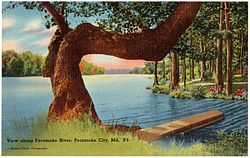Pocomoke City, MD
| Pocomoke City, Maryland | ||
|---|---|---|
| City | ||
 |
||
|
||
| Nickname(s): Friendliest Town on the Eastern Shore | ||
 Location in Worcester County and the state of Maryland |
||
| Location within the state of Maryland | ||
| Coordinates: 38°4′8″N 75°33′42″W / 38.06889°N 75.56167°WCoordinates: 38°4′8″N 75°33′42″W / 38.06889°N 75.56167°W | ||
| Country | United States | |
| State | Maryland | |
| County | Worcester | |
| Incorporated | 1878 | |
| Government | ||
| • Mayor | Bruce Morrison | |
| Area | ||
| • Total | 3.94 sq mi (10.20 km2) | |
| • Land | 3.69 sq mi (9.56 km2) | |
| • Water | 0.25 sq mi (0.65 km2) | |
| Elevation | 7 ft (2 m) | |
| Population (2010) | ||
| • Total | 4,179 | |
| • Estimate (2016) | 4,101 | |
| • Density | 1,100/sq mi (410/km2) | |
| Time zone | Eastern (EST) (UTC−5) | |
| • Summer (DST) | EDT (UTC−4) | |
| ZIP code | 21851 | |
| Area code | 410, 443 | |
| FIPS code | 24-62475 | |
| GNIS feature ID | 0591031 | |
| Website | www.cityofpocomoke.com | |
Pocomoke City, dubbed "the friendliest town on the Eastern Shore", is a city in Worcester County, Maryland, United States. Although renamed in a burst of civic enthusiasm in 1878, the city is regularly referred to by its inhabitants simply as Pocomoke /ˈpoʊkoʊmoʊk/. The population was 4,184 at the 2010 census. It is part of the Salisbury, Maryland-Delaware Metropolitan Statistical Area.
Beginning in the late seventeenth century, a small settlement called Stevens Landing (sometimes Stevens Ferry) grew at the ferry landing on the south bank of the Pocomoke River. The town was incorporated as Newtown (or New Town) in 1865, but was reincorporated in 1878 as Pocomoke City, after the American Indian name of the river, meaning "black water."
Stevens Landing, and then Newtown, remained a modest river crossing until the construction through the town in the 1880s of the trunk railroad line along the Delmarva Peninsula from Wilmington, Delaware, to Cape Charles on the Eastern Shore of Virginia. The line eventually became part of the Pennsylvania Railroad. In addition to agriculture, industry such as lumber milling and shipbuilding and, in the twentieth century, factories making barrels and baskets for truck crops, and the canning of those crops, aided the town's growth.
On 14 June 1906, the city was the site of a lynching. A farmhand named Edd Watson was murdered by a mob. Press reports indicate other lynchings also happened in the town.
...
Wikipedia



